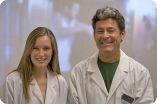(Press-News.org) In the quantum world, making the simple atom behave is one thing, but making the more complex molecule behave is another story.
Now Northwestern University scientists have figured out an elegant way to stop a molecule from tumbling so that its potential for new applications can be harnessed: shine a single laser on a trapped molecule and it instantly cools to the temperature of outer space, stopping the rotation of the molecule.
"It's counterintuitive that the molecule gets colder, not hotter when we shine intense laser light on it," said Brian Odom, who led the research. He is an assistant professor of physics and astronomy in the Weinberg College of Arts and Sciences. "We modify the spectrum of a broadband laser, such that nearly all the rotational energy is removed from the illuminated molecules. We are the first to stop molecular tumbling in such a powerful yet simple way."
It is not very difficult to trap many types of molecules and hold them precisely in place, Odom said, but they stubbornly persist in rotating just as much as if they were not trapped at all. Using their customized laser, he and his colleagues cooled singly charged aluminum monohydride molecules from room temperature to 4 degrees Kelvin (minus 452 degrees Fahrenheit) in a fraction of a second. The abrupt temperature drop stopped the molecules' normally persistent tumbling motion in its tracks.
Such control of molecules, of their rotational and vibrational states, is essential to using molecules in the construction of superfast quantum computers -- machines whose processing power would be exponentially faster than today's computers.
The new technique is faster, easier and more practical and efficient than techniques developed thus far to control molecules. Details will be published Sept. 2 by the journal Nature Communications.
Previously, it was long assumed that far too many lasers would be required to cool molecular rotations. However, broadband laser light contains many different frequency components, and the Northwestern researchers used those components to custom design a laser for their task. They filtered out the part of the spectrum that causes molecules to start spinning faster (and become hotter) while leaving in the useful frequency components that slows the molecules down (and also cools them).
Also noteworthy, Odom said, is that they cooled the molecule to its very lowest quantum rotational state using a room-temperature apparatus, not the cumbersome liquid helium cryostats some other researchers have used.
"In our quantum world, every type of motion has only certain allowed energies," said Odom, an atomic physicist. "If I want to slow down a molecule, quantum mechanics tells me that it happens in steps. And there is a very lowest step that we can get the molecule down to, which is what we've done."
Odom and his team chose to work with singly charged aluminum monohydride molecules because the molecule does not vibrate when it interacts with a laser.
"By choosing the right molecule we were able to stop the molecules from rotating without worrying about the vibrations," Odom said.
Aluminum monohydride molecules are inexpensive and could be used in wide range of applications, beyond quantum computing.
"There is a lot you can do if you get one species of molecule under control, such as we've done in this study," Odom said.
In addition to quantum information processing, applications that could springboard off this new ability to control molecular rotors include ultracold quantum-controlled chemistry and tests of whether fundamental constants are truly static or if they vary in time.
The title of the paper is "Broadband optical cooling of molecular rotors from room temperature to the ground state."
INFORMATION:
In addition to Odom, authors of the paper are Chien-Yu Lien, Christopher M. Seck, Yen-Wei Lin, Jason H.V. Nguyen, David A. Tabor, all of Northwestern.
Single laser stops molecular tumbling motion instantly
Quantum control of molecules could lead to extremely fast computers
2014-09-02
ELSE PRESS RELEASES FROM THIS DATE:
NYU study compares consequences of teen alcohol and marijuana use
2014-09-02
Growing public support for marijuana legalization in the U.S. has led to public debate about whether marijuana is "safer" than other substances, such as alcohol. In January, President Obama also publically stated he is not convinced that marijuana is more dangerous than alcohol. Despite the recent shift in views toward marijuana, the harms of use as compared to alcohol use are not well understood.
Now a new study "Adverse Psychosocial Outcomes Associated with Drug Use among US High School Seniors: A Comparison of Alcohol and Marijuana," by researchers affiliated with ...
Discovery hints at why stress is more devastating for some
2014-09-02
Some people take stress in stride; others are done in by it. New research at Rockefeller University has identified the molecular mechanisms of this so-called stress gap in mice with very similar genetic backgrounds — a finding that could lead researchers to better understand the development of psychiatric disorders such as anxiety and depression.
"Like people, each animal has unique experiences as it goes through its life. And we suspect that these life experiences can alter the expression of genes, and as a result, affect an animal's susceptibility to stress," says senior ...
Simple awareness campaign in general practice identifies new cases of AF
2014-09-02
Barcelona, Spain – Tuesday 2 September 2014: A simple awareness campaign in general practice identifies new cases of atrial fibrillation (AF), according to research presented at ESC Congress today by Professor Jean-Marc Davy from France.
Professor Davy said: "Atrial fibrillation (AF) is the most common cardiac arrhythmia. It multiplies the risk of heart failure risk by three-fold and the risk of stroke risk by five-fold. Similarly, AF is responsible for ischaemic stroke in 1 of 4 cases. However, AF is often overlooked and diagnosed too late. In 20% of cases, AF is diagnosed ...
ROCKET AF trial suggests that digoxin increases risk of death in AF patients
2014-09-02
Barcelona, Spain – Tuesday 2 September 2014: Digoxin may increase the risk of death in patients with atrial fibrillation (AF) by approximately 20%, according to results from the ROCKET AF trial presented at ESC Congress today by Dr Manesh Patel, director of interventional cardiology and catheterisation labs at Duke University Health System in Durham, North Carolina, US. The findings suggest that caution may be needed when using digoxin in complex AF patients but further studies are needed to confirm the observations.
Dr Patel said: "In this subanalysis of the ROCKET AF ...
Health structures explain nearly 20 percent of non-adherence to heart failure guidelines
2014-09-02
Barcelona, Spain – Tuesday 2 September 2014: Health structures explain nearly 20% of the non-adherence to heart failure guidelines, according to the results of a joint ESC-OECD study presented today at ESC Congress by Professor Aldo Maggioni. Clinical variables explained more than 80% of non-adherence.
Professor Maggioni said: "This is a unique evaluation which combines clinical data and health structure characteristics of different countries. It provides a fuller picture of the reasons some patients with heart failure do not receive treatment according to ESC guidelines."
Heart ...
Mechanical heart valves increase pregnancy risk
2014-09-02
Barcelona, Spain – Tuesday 2 September 2014: The fact that mechanical heart valves increase risks during and after pregnancy, has been confirmed by data from the ROPAC registry presented for the first time today in an ESC Congress Hot Line session by Professor Jolien W. Roos-Hesselink, co-chair with Professor Roger Hall of the registry's executive committee. The registry found that 1.4% of pregnant women with a mechanical heart valve died and 20% lost their baby during pregnancy.
The Registry Of Pregnancy And Cardiac disease (ROPAC) is an ongoing worldwide registry that ...
The key to drilling wells with staying power in the developing world
2014-09-02
What happens after a well is drilled, fitted with a hand pump, and a community celebrates having access to clean water for the first time? Half of them break down in a year.
When a community lacks sufficient resources and training, these wells would be rendered unusable; however, a new study by the University of North Carolina-Chapel Hill's (UNC) Water Institute and Water and Sanitation for Africa, a Pan-African humanitarian agency, found that if local water communities collect fees for repairs and train community members to fix the wells, they can remain in use for ...
Cannabis withdrawal symptoms common among adolescents treated for substance use disorder
2014-09-02
Although cannabis – commonly known as marijuana – is broadly believed to be nonaddictive, a study by Massachusetts General Hospital (MGH) investigators found that 40 percent of cannabis-using adolescents receiving outpatient treatment for substance use disorder reported experiencing symptoms of withdrawal, which are considered a hallmark of drug dependence. Study participants reporting withdrawal were more likely to meet criteria for severe substance use and for mood disorders, although the presence or absence of withdrawal did not appear to change long-term treatment ...
WSU 'deadly force' lab finds racial disparities in shootings
2014-09-02
SPOKANE, Wash.—Participants in an innovative Washington State University study of deadly force were more likely to feel threatened in scenarios involving black people. But when it came time to shoot, participants were biased in favor of black suspects, taking longer to pull the trigger against them than against armed white or Hispanic suspects.
The findings, published in the recent Journal of Experimental Criminology, grow out of dozens of simulations aimed at explaining the disproportionate number of ethnic and racial minorities shot by police. The studies use the most ...
Experts defend operational earthquake forecasting, counter critiques
2014-09-02
SAN FRANCISCO -- Experts defend operational earthquake forecasting (OEF) in an editorial published in the Seismological Research Letters (SRL), arguing the importance of public communication as part of a suite of activities intended to improve public safety and mitigate damage from earthquakes. In a related article, Italian scientists detail the first official OEF system in Italy.
What is known about the probability of an earthquake on a specific fault varies over time, influenced largely by local seismic activity. OEF is the timely dissemination of authoritative scientific ...
LAST 30 PRESS RELEASES:
Alkali cation effects in electrochemical carbon dioxide reduction
Test platforms for charging wireless cars now fit on a bench
$3 million NIH grant funds national study of Medicare Advantage’s benefit expansion into social supports
Amplified Sciences achieves CAP accreditation for cutting-edge diagnostic lab
Fred Hutch announces 12 recipients of the annual Harold M. Weintraub Graduate Student Award
Native forest litter helps rebuild soil life in post-mining landscapes
Mountain soils in arid regions may emit more greenhouse gas as climate shifts, new study finds
Pairing biochar with other soil amendments could unlock stronger gains in soil health
Why do we get a skip in our step when we’re happy? Thank dopamine
UC Irvine scientists uncover cellular mechanism behind muscle repair
Platform to map living brain noninvasively takes next big step
Stress-testing the Cascadia Subduction Zone reveals variability that could impact how earthquakes spread
We may be underestimating the true carbon cost of northern wildfires
Blood test predicts which bladder cancer patients may safely skip surgery
Kennesaw State's Vijay Anand honored as National Academy of Inventors Senior Member
Recovery from whaling reveals the role of age in Humpback reproduction
Can the canny tick help prevent disease like MS and cancer?
Newcomer children show lower rates of emergency department use for non‑urgent conditions, study finds
Cognitive and neuropsychiatric function in former American football players
From trash to climate tech: rubber gloves find new life as carbon capturers materials
A step towards needed treatments for hantaviruses in new molecular map
Boys are more motivated, while girls are more compassionate?
Study identifies opposing roles for IL6 and IL6R in long-term mortality
AI accurately spots medical disorder from privacy-conscious hand images
Transient Pauli blocking for broadband ultrafast optical switching
Political polarization can spur CO2 emissions, stymie climate action
Researchers develop new strategy for improving inverted perovskite solar cells
Yes! The role of YAP and CTGF as potential therapeutic targets for preventing severe liver disease
Pancreatic cancer may begin hiding from the immune system earlier than we thought
Robotic wing inspired by nature delivers leap in underwater stability
[Press-News.org] Single laser stops molecular tumbling motion instantlyQuantum control of molecules could lead to extremely fast computers




